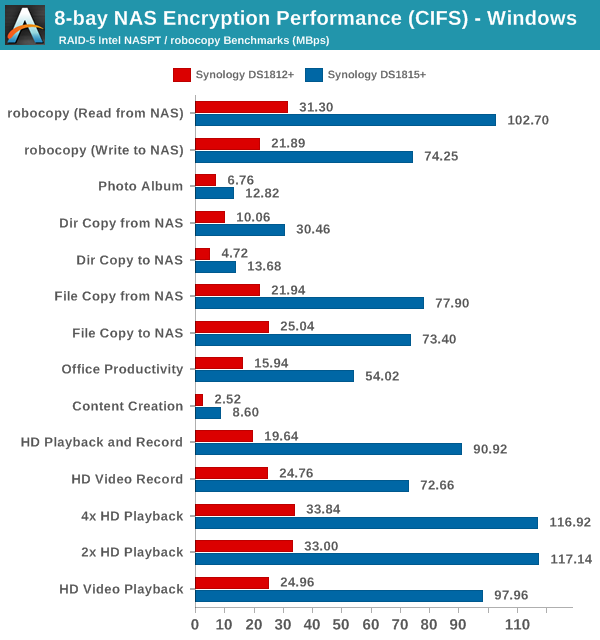Synology DS1815+ 8-bay Intel Rangeley SMB NAS Review
by Ganesh T S on November 18, 2014 6:30 AM ESTEncryption Support Evaluation
Consumers looking for encryption capabilities can opt to encrypt a iSCSI share with TrueCrypt or some in-built encryption mechanism in the client OS. However, if requirements dictate that the data must be shared across multiple users / computers, relying on encryption in the NAS is the best way to move forward. Most NAS vendors use the industry-standard 256-bit AES encryption algorithm. One approach is to encrypt only a particular shared folder while the other approach is to encrypt the full volume. Synology supports only folder-level encryption for now in DSM.
On the hardware side, encryption support can be in the form of specialized hardware blocks in the SoC (common in ARM / PowerPC based NAS units). In x86-based systems, accelerated encryption support is dependent on whether the AES-NI instruction is available on the host CPU. One of the most attractive features of the Intel Rangeley platform / Silvermont cores is full hardware acceleration for all essential cryptography functions. The results, as you can see below, are consistent across all evaluated scenarios. The penalty compared to unencrypted shares is non-existent.

The above graph shows why AES-NI is essential for users looking to encrypt shared folders / volumes in NAS units










65 Comments
View All Comments
vLsL2VnDmWjoTByaVLxb - Tuesday, November 18, 2014 - link
Sorry, that was meant as a response for JeffFlanagan's post above. :\JustaUsernameorWE - Tuesday, November 18, 2014 - link
Anyone have any idea when/if they'll put Rangeley in a 2bay unit? Not thrilled with the current 2 bay market.ganeshts - Tuesday, November 18, 2014 - link
Synology doesn't have one (yet), but the Seagate NAS Pro 2-bay should fit your needshttp://www.seagate.com/products/network-attached-s...
It is based on Rangeley too, albeit a 2C/2T model running at 1.7 GHz.
romrunning - Tuesday, November 18, 2014 - link
Is there any specs on how these perform when compare to a simple, business-class server that has 8-bays? Something like a Dell PowerEdge T320 that has the capability for 8 x 3.5" drives and includes a quad-port GB NIC can be had for basically the same price as the Synology here.These larger-cost 8-bay NAS machines have a high price tag, so a natural competitor (in terms of price) seems to be servers from the standard server vendors. So I would love to see how it actually compares.
peterfares - Tuesday, November 18, 2014 - link
Poorly. Their only advantages over a computer are smaller and more power efficient. People will talk about how it saves so much time but you have to save quite a lot of time to make up the difference in cost between a synology and a much cheaper and faster computer.romrunning - Wednesday, November 19, 2014 - link
I also would like to know if some of the poor network performance numbers shown by these selected NAS units are also present in a full server setup.I guess we'll never know because these review units likely come with caveats on what type of "competing" devices they can reviewed against.
dgingeri - Tuesday, November 18, 2014 - link
An Atom processor, 8 bays, 2GB of memory, and 8 bays, for $1050. I could build better for less, and get more flexibility.peterfares - Tuesday, November 18, 2014 - link
BUT YOU CAN SAVE SO MUCH TIME WITH A SYNOLOGY!!!!!Haha. Those peoples time must be worth a lot. And if it's worth that much, why are they going for a Synology and not something better?
rpg1966 - Tuesday, November 18, 2014 - link
:rolleyes:DiHydro - Wednesday, November 19, 2014 - link
My time, plus any employees or services I have on the NAS could cost me the initial price each *hour* if it goes down. So having one physical unit, with hot swap, and on the fly rebuild is worth the price in some cases.